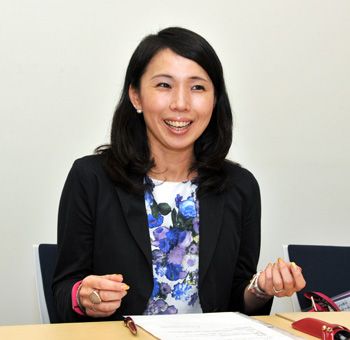|
September 13, 2015
Benefits of being an in-house interpreter
By Chiho Iuchi
Staff writer
While many interpreters and translators work on a freelance basis, Rie Jindo has chosen to be an in-house interpreter for foreign-affiliated companies for the past 11 years.

Rie Jindo shares her experience as an in-house interpreter working for foreign-affiliated companies in Tokyo during a recent interview with The Japan Times. YOSHIAKI MIURA
"In my interpretation courses, I was inspired by a teacher who had business experience," Jindo said.
Born in Chiba Prefecture, Jindo started studying English at a young age as an after-school activity and fell in love with language learning. Besides English classes in junior high school, she continued private lessons with a native speaker in her neighborhood and spent six weeks in Australia on her summer vacation during high school.
In university, Jindo majored in linguistics and spent one year studying in the U.K. Although she initially thought about pursuing an academic path and earned her master's degree in linguistics, she also attended an interpretation course during graduate school and eventually decided to become an interpreter.
After working two years for a Japanese automobile manufacturer, while continuing her interpretation studies, she got her first job as an in-house interpreter at a foreign-affiliated advertising agency. One of her duties was to interpret meetings between creative staff and client marketing people.
"I was shocked because I did not understand the conversation at all. The level of the vocabulary was much higher than I had studied," Jindo confessed. "I became keenly aware of my lack of English ability."
This experience made her scared of English somewhat, which she had enjoyed since childhood. However, what she did next was to newly take up a Spanish course.
"It was fun to learn a new language and it helped me regain self-confidence in my English language skills, which were naturally much higher than my beginner-level Spanish," Jindo said.
Jindo's on-the-job experience as an in-house interpreter at the agency and later at various other companies gradually elevated her to a professional interpreter. At the same time, she continued taking interpretation courses, which were very helpful.
"At school, teachers give us extensive feedback on our work," Jindo said. "Also, the assignments serve as coercive forces to help me keep up with upgrading my training as an interpreter, which would otherwise be hard for me to do by myself."
For eight years, she has worked for a foreign-affiliated life insurance company in Tokyo as a manager of the company's translation team. Her main role is to serve as interpreter for non-Japanese members at meetings and conferences. Her duties also include translating the conference materials and proceedings.
"One of the merits of working as an in-house interpreter is access to relevant experts inside the company," Jindo pointed out. "In this company, I've learned a lot about finance and insurance, which I didn't know before. I enjoy listening to these experts very much and am happy to bridge their high-level conversations as a colleague."
To keep up with the meetings that she attends, Jindo has continued unremittingly her efforts.
"For example, I read articles and check the topics related to our job in English newspapers such as the Financial Times every day. Also, I try to check companies' announcements of financial statements and listen to the financial news reports in English," Jindo said.
While continuing her work, Jindo recently started studying intercultural communication at graduate school.
"Master's course again," she said with a laugh. To study Spanish, and now Portuguese as well, in addition to English, she often attended college sessions open to the public, which attracted her with a diversity of participants who were motivated to learn languages.
"It would be great if I can share my experience as an interpreter with such people while also learning from them to broaden my perspective," Jindo said, even more motivated.
|